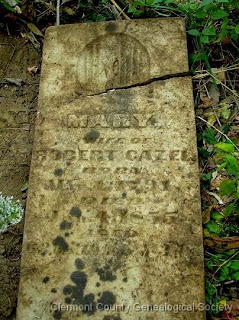"Once you were lost, but now you are found"

Davis built a log cabin there and on March 1, 1806, Roger W. Waring, justice of the peace joined 24 year old Joseph and 16 year old Rachel Fowler in Holy matrimony. The newlyweds carried all their household goods on a horse to their new home, the bride following with her dishes of pewter in her apron. There was no floor in the cabin and their beds were made of sticks and saplings, as were also their tables. At that time that part of Union township was a wilderness, but he eventually claimed over 400 acres of land. Ten children were born to Joseph and Rachel; Mathew, Jeremiah, Joseph, Samuel, Thomas, Henry, Robert F., Ira L., George W., and William B.


During the War of 1812, 31 year old Davis served as a lieutenant in Captain Daniel Hosbrook’s company at Fort Amanda. Schillinger mentions him often throughout his journal. Those entries are as follows:
Wednesday Feb 17
This morning the Captain and Lieutenant being absent, I paraded the company. All well but one man, M. Strickland. This morning received from Mr. Tootens, some clothes from home and with them my wife’s profile. At 3 o’clock this afternoon we got word that the baggage we were waiting for had taken the road to Franklin. We marched at 3 o’clock and moved 5 miles out of town and camped for the night.
Monday Feb 22
This morning cold and cloudy. Paraded at 7 o’clock. Found 3 men sick. Prepared to march at 10 o’clock agreeable to orders. At 5 o’clock our Brigadier and Lieutenant came out and on parade, the General read the articles and regulations of the armies of the U. S. and gave us orders to march at 8 o’clock tomorrow.
Friday Mar 5
Cool and cloudy. We had almost all our men on fatigue cleaning up the fort and grounds adjacent. Lieutenant Davis, officer of police and I went out hunting but found no game but a few ducks which we could not get to shoot. After some time spent in vainly attempting to get some game, we returned home and took our dinner. After examination I found that two men belonging to Captain Seaton’s company had deserted. Spent this evening writing letters.
Tuesday Mar 16
At day break the morning gun was fired at 7 o’clock. Captain Manary with his company of Rangers (being discharged) paraded to march for homeward. The Colonel ordered a salute to be fired at their march which was done by firing a 6 pounder. Took breakfast. At 9 o’clock the court was called. There being one supernumerary, I was permitted to return to Fort Amanda. I proceeded at 11:30, accompanied by Captain Ball, our Wagon Master and arrived at Amanda at 4 o’clock. Found all well. The Lieutenant with his fatigue party began to dig the trench for the stockading and intended addition .
Wednesday Mar 17
Last night heavy rain with thunder and continued raining in showers. After breakfast all hands paraded and proceeded to throw into the river, a large quantity of dead hogs and skins and entrails that had been left on the bank above the fort, which were beginning to be offensive by reason of putrefaction. After dinner the Lieutenant and myself went over the river hunting but found no game but some squirrels which were very wild. We shot one and returned to the fort. Weather warm and showery.
Saturday Mar 27
This day, all hands washing our clothes, gathering wood, etc. Lieutenant (Davis) and 1 man went out hunting to get some game to make our Captain some soup. Killed a pheasant. In the afternoon, I went out with out cook to get a broom stick. He took the gun and as we happened along the bank of the river, discovered a fine large Pike in shallow water and shot it. At 6 o’clock it began to rain. Wrote a letter to send to my wife.
Monday May 17
Clear and pleasant. Our men making cartridges. Paid Captain Perry for what sugar we got from him of Captain Walls. Sent my letter by Captain Hixon, who goes into the settlement with all his hands that was building boats. This morning our wagon left the fort for home, it being discharged by Colonel Orr. The Captain and Lieutenant went out spying. Made no discoveries of any of the enemy. They found a number of articles which was lost by the Kentuckians. I bought some fish from the Indians. Our men put a fist pot in the river today.
Sunday June 20
This morning the Brigade Major inspected the company. Gave them credit for their good appearance. Left the fort in company with Major Kain who is ordered to Fort Winchester. Milikin and Heaton left at 10 o’clock. At 2 o’clock, Lieutenant Davis left the effort to go home for a few days. Took a number of letters from the company. Doctor Lewis accompanied him as far as St. Mary’s. This evening 1 man who had been sent in company with Neville returned and brought us the word that they had only gotten 6 miles from the fort when the horse gave out.
Saturday July 10
Very cold for the season. At 12 o’clock Lieutenant Davis returned to the fort. Brought a letter from Captain Armstrong to me. All well. Mr. Kercheval returned from Fort Jennings.
Sunday Aug 1
Clear and warm. Lieutenant Davis and sergeant Bradbury went to Fort Logan today. This afternoon, Captain Benagh and Mr. Steel went to St. Mary’s. Sent one of our sick men and one man to take care of him. F. Duchouquet, Indian Interpreter came to the fort to draw provisions for the Shawnees.
Tuesday Aug 3
This morning clear and warm. Captain Brier took command of the fort. We prepared to leave it. Delivered up our arms, etc. Our men being all dismissed, Captain, Lieutenant and myself, on examination found that the horses which we had in keeping to take us home were gone. Some evil disposed persons having drove them off, and we could not find them. We then applied to the Quartermaster for others but obtained but one, on which I loaded our baggage and proceeded by way of St. Mary’s. The Captain and Lieutenant went by way of Fort Logan. I agreed to meet them at Mr. Stotlers, 2 miles below Piqua. I arrived at St. Mary’s about 6 o’clock PM, being 4 hours from Amanda. Stayed here all night.
According to some sources, Davis served 2 tours of duty during the war. A county history says that in addition to serving as a lieutenant in Hosbrook’s company, and participating in the siege of Fort Meigs, near Perrysburg, Oh, he also served under Colonel Crogan in his gallant defense of Fort Stephenson, at what is now the city of Fremont, Ohio. That has yet to be confirmed.
Davis arrived back home on Saturday, August 7, 1813. He went on to become a successful farmer and a greatly respected member of his community (Perintown, O) He was a deeply religious man and spent much of his life serving several offices in his church. He also served many years as a Justice of the Peace because he was considered an upright and honest man.
Court records show that no appeals were ever taken involving cases in his docket. He was public spirited and having risen from a poor boy to one of the substantial men of the County, he took great interest in all public improvements.
Joseph’s wife Rachel died on Christmas Day in 1837 at the age of 47. Her epitaph reads, “Aged 47y 10m 12d.” Four months later, on April 8, 1838, Joseph married 43 year old Rebecca Vail.
Joseph Davis, pioneer, patriot, soldier who helped build part of Ft. Amanda, a mediocre hunter (as portrayed by Schillinger :-)), an educated man, father of 10, a religious man, a successful farmer, civic leader and highly respected citizen, died on Tuesday July 17, 1855, at his home in Union Township. He was 73 years old. Rebecca died 15 years later on December , 1870. Her burial site is unknown but more than likely it's in the same cemetery (Round Bottom) as Joseph and Rachel.
Joseph and Rachel are buried side by side in a small and all but forgotten cemetery on Round Bottom Road near Perintown. Like many old cemeteries, it isn’t marked and difficult to find. Only a couple stones remain upright, the others covered by leaves, dirt and debris. I found it only by chance talking with residents of a lovely old stone home at 956 Round Bottom Rd. who showed me the location.
Note: the empty plastic bottle held water to clean the stones. It was properly disposed of.
Grave marker of 47 year old Rachel Fowler Davis, wife of Lt. Joseph Davis, pioneer woman, mother of 10, endurer of hardships and no less a patriot than her husband. And like her husband we shall remember her as well.

Finding graves, particularly those of soldiers at Ft. Amanda can sometimes be little bittersweet. Such was the case of Lt. Davis. I’d come to know him pretty well through Schillinger’s journal entries and through my own research through census records, county histories and other genealogical sources. I guess I’d hoped I’d find him in a well manicured gated cemetery perhaps in a veterans section with his grave marked with an official War of 1812 headstone; he deserved that. Instead what I found was only a footstone with his initials, "J D" buried under leaves branches and other forest debris on a small rise a few feet behind a metal storage building with a gravel parking lot. I shouldn't have been too surprised as I've found some of Davis' comrades buried in the middle of a field, alongside a road, even under a paved parking lot.

















